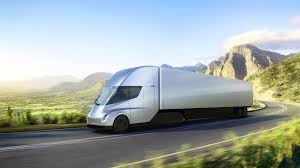
PepsiCo Inc has been attempting to reduce transportation and fuel costs as well as emissions from its fleet of transportation. For this purpose, the software and chips maker has placed an order of 100 new electric Semi trucks with Tesla Inc which is the largest order till date for the auto maker for its big rig.
Tesla claims that the electric trucks that it can produce have capacities in rage of travel on a single charge and the cargo carrying capacity comparable with that of diesel trucks that are proven low cost and time-tested carriers. And the auto maker has been trying to convince the trucking community about these attributes of its Semi trucks.
However, the overall uncertainty about the future of electric commercial vehicles, skepticism about the range of travel on a single charge, duration of charging time compared to a fill up of diesel and the payload transportable are the factors that have so far kept away the trucking community from Tesla.
According to the trucking industry economics research firm, annually about 260,000 heavy-duty Class-8 trucks are manufactured in North America currently.
Tesla faces other challenges too. While auto maker and Tesla rival Daimler AG’s smaller range of electric trucks are already being used by customers in New York and elsewhere, work on the launch of an electric medium duty truck is fast ongoing at Navistar International Corp and Volkswagen AG’s Truck and Bus division – and both plan to launch them in 2019.
Till date, orders for its electric trucks have been placed with Tesla by more than a dozen companies that include names like fleet company J.B. Hunt Transport Services Inc, food service distribution firm Sysco Corp and Wal-Mart. This list is added on by PepsiCo’s 100 trucks order. According to sources, the total order number for Tesla electric trucks are at least 285.
Transportation of snack foods and beverages from the manufacturing units to and distribution facilities and retailers who lie within a range of 500-mile (800-km) is the intention of PepsiCo in purchasing the Tesla Semis. The 500 mile range has been promised by Tesla founder Elon Musk.
Mike O‘Connell, senior director of North American supply chain for PepsiCo subsidiary Frito-Lay said that the company has an announced target of reduction of greenhouse gas emissions within its entire supply chain by at least 20 percent on the overall by 2030, and the 100 Tesla Semi trucks would help the company achieve that objective. The company at presents has a fleet of about 10,000 big rigs.
O‘Connell said that the company has already visualized multiple usability of the Tesla Semis especially in relation to transportation of lighter loads like snacks or for shorter trips for heavier cargo even as it is working out the best routes where the Semis can be deployed.
There were no comments made from Tesla.
The Semi trucks were unveiled by Tesla in November production is expected to begin in 2019.
(Source:www.reuters.com)
Tesla claims that the electric trucks that it can produce have capacities in rage of travel on a single charge and the cargo carrying capacity comparable with that of diesel trucks that are proven low cost and time-tested carriers. And the auto maker has been trying to convince the trucking community about these attributes of its Semi trucks.
However, the overall uncertainty about the future of electric commercial vehicles, skepticism about the range of travel on a single charge, duration of charging time compared to a fill up of diesel and the payload transportable are the factors that have so far kept away the trucking community from Tesla.
According to the trucking industry economics research firm, annually about 260,000 heavy-duty Class-8 trucks are manufactured in North America currently.
Tesla faces other challenges too. While auto maker and Tesla rival Daimler AG’s smaller range of electric trucks are already being used by customers in New York and elsewhere, work on the launch of an electric medium duty truck is fast ongoing at Navistar International Corp and Volkswagen AG’s Truck and Bus division – and both plan to launch them in 2019.
Till date, orders for its electric trucks have been placed with Tesla by more than a dozen companies that include names like fleet company J.B. Hunt Transport Services Inc, food service distribution firm Sysco Corp and Wal-Mart. This list is added on by PepsiCo’s 100 trucks order. According to sources, the total order number for Tesla electric trucks are at least 285.
Transportation of snack foods and beverages from the manufacturing units to and distribution facilities and retailers who lie within a range of 500-mile (800-km) is the intention of PepsiCo in purchasing the Tesla Semis. The 500 mile range has been promised by Tesla founder Elon Musk.
Mike O‘Connell, senior director of North American supply chain for PepsiCo subsidiary Frito-Lay said that the company has an announced target of reduction of greenhouse gas emissions within its entire supply chain by at least 20 percent on the overall by 2030, and the 100 Tesla Semi trucks would help the company achieve that objective. The company at presents has a fleet of about 10,000 big rigs.
O‘Connell said that the company has already visualized multiple usability of the Tesla Semis especially in relation to transportation of lighter loads like snacks or for shorter trips for heavier cargo even as it is working out the best routes where the Semis can be deployed.
There were no comments made from Tesla.
The Semi trucks were unveiled by Tesla in November production is expected to begin in 2019.
(Source:www.reuters.com)














